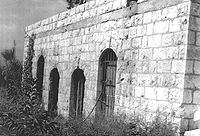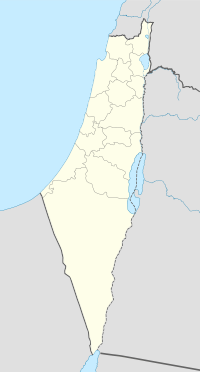Abu Kishk
| Abu Kishk | |
|---|---|

Old school of Abu Kishk, picture taken between 1940-1950.
|
|
| Arabic | ابو كشْك |
| Subdistrict | Jaffa |
| Coordinates | 32°8′10.73″N 34°51′55.21″E / 32.1363139°N 34.8653361°ECoordinates: 32°8′10.73″N 34°51′55.21″E / 32.1363139°N 34.8653361°E |
| Palestine grid | 136/170 |
| Population | 1900 (1945) |
| Area | 17,121 dunams |
| Date of depopulation | 30 March 1948 |
| Cause(s) of depopulation | Fear of being caught up in the fighting |
| Secondary cause | Influence of nearby town's fall |
| Current localities | Herzliya |
Abu Kishk (Arabic: أبو كشك) was a Palestinian village in the Jaffa Subdistrict located 12 km northeast of Jaffa, situated 2 km northwest of the Yarkon River. The village was depopulated during the 1947–1948 Civil War in Mandatory Palestine on 30 March 1948 by the Israeli attacking brigade of the Irgun Tzvai Leumi.
The "Arab Abu-Kishk" is a bedouin tribe that owned large areas in the Sharon plain, from Herzliya to Petah-Tikva.
On 1921 Abu Kishk and other near Arabs villages attacked the Jewish villages, Petah Tikva and Kfar Saba. The attack was foiled, and Abu Kishk Sheikh was sentenced to pay a big fine to the Jews. Therefore, he was coerced to sell his territories. On 4 June 1924 The Jewish organization Hachsharat HaYishuv purchased territories of 4,197 Dunam for 3.5 Palestine pound per dunam.
In 1945 the population of the village was about 1,900, about 300 of them lived in the area of the future Herzliya.
The village was situated about 2 kilometers (1.2 mi) northwest of the Yarkon River. Secondary roads linked it to the Jaffa-Haifa highway and to neighboring villages.
In 1925 the village school was founded. By the mid-1940s it had 108 students, including 9 girls.
At the time of the 1931 census, Abu Kishk had a population of 1007 residents, all Muslims.
In 1944/45 a total of 2,486 dunums of village land was used for citrus or bananas, 14,018 was planted with cereals; while 226 dunums were irrigated or used for orchards.
...
Wikipedia

